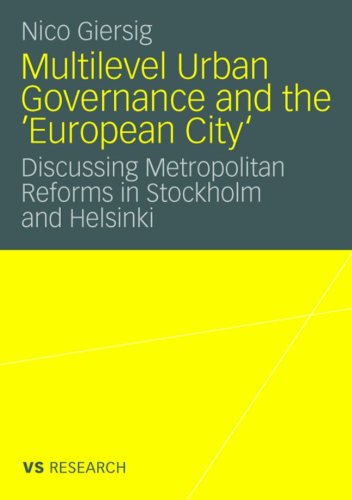

Most ebook files are in PDF format, so you can easily read them using various software such as Foxit Reader or directly on the Google Chrome browser.
Some ebook files are released by publishers in other formats such as .awz, .mobi, .epub, .fb2, etc. You may need to install specific software to read these formats on mobile/PC, such as Calibre.
Please read the tutorial at this link: https://ebookbell.com/faq
We offer FREE conversion to the popular formats you request; however, this may take some time. Therefore, right after payment, please email us, and we will try to provide the service as quickly as possible.
For some exceptional file formats or broken links (if any), please refrain from opening any disputes. Instead, email us first, and we will try to assist within a maximum of 6 hours.
EbookBell Team

4.7
106 reviews
ISBN 10: 3531909991
ISBN 13: 9783531909998
Author: Nico Giersig
“The question is no longer simply what autonomy actually is for local authorities within the state, but rather what capacity territories have to become collective actors of European governance. ” (Le Galès 2002: 235) This book is designed to be an empirical and theoretical contribution to debates on currently changing forms of urban policies and politics in Western Europe. To put it differently, the issue of multilevel urban governance analysis can be found at the heart of this work. Undoubtedly, political decision making in and for cities as well as the academic reflection upon it have been in flux throughout recent decades – and in most instances, these changes have been associated with all-encompassing mac- structural transformations that have left their imprint in virtually all Western Eu- pean countries. For example, discussing phenomena such as the crisis of ‘Fordism’ and ‘national Keynesianism’ or the rise of economic globalization, urban scholars have come to ask what these shifts might imply for the political role of cities. Some have claimed that cities are likely to strengthen their role as politically relevant - tors at the expense of national governments today, while others have diagnosed an overall decline of state regulation, ‘the political’, or even a general dissolution of ‘spaces of place’ in the information age (for overviews see Amin 1994; Blanke and Benzler 1991; Castells 2000).
Introduction
Multilevel Urban Governance: Origin, Core Issues, Current Debates
Theories of Urban Politics and Policies in a Changing Context
From Urban Government to Multilevel Urban Governance
Integrated Multilevel Urban Governance Analysis: Comparing Neostructuralist and Neo-Weberian Approaches
Metropolitan Governance Reforms in Stockholm and Helsinki: An Indicator for Governance Transformations in Sweden and Finland
Explaining the Rationale of the Research Focus
The Nordic Countries: A Comprehensive Political and Societal Model
The Helsinki and Stockholm Regions in Context: Structural Characteristics, Recent Trends and New Challenges
Metropolitan Cooperation, Integration and Conflict: Comparing Modes of Governance in the Finnish and Swedish Capital Regions
Concluding Assessments
multilevel governance
multilevel governance was developed in response to
multilevel governance was initially focused on
multilevel governance in the eu
european urban model
Tags: Nico Giersig, Multilevel, Urban, Governance, European